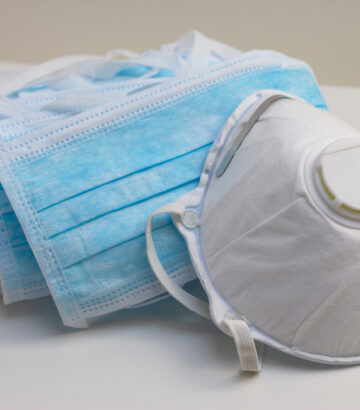HICPAC Vote Calls for Surgical Masks Instead of Respirators Despite Expert and Public Outcry
Despite continuing significant COVID-19 hospitalizations and emergency room visits, and deaths, scattered COVID outbreaks in hospitals across the country (Massachusetts, Vermont, New York, Hawaii), and the arrival of the COVID-19, flu and RSV seasons, the Centers for Disease Control and Prevention (CDC)’s Healthcare Infection Control Practices Advisory Committee (HICPAC) voted on November 3rd to approve drafted guidelines that would weaken existing standards for respiratory infection control guidance in health facilities. During HICPAC’s June, August, and November 2nd – November 3rd 2023 meetings, hundreds of concerned members of the public – including healthcare professionals, industrial hygienists, physicians, patients, and advocates – submitted oral or written comments expressing outspoken opposition to HICPAC’s inadequate proposed respiratory infection control guidelines. Some commenters were patients, or parents of patients, who acquired COVID-19 when receiving medical care, and are now experiencing serious health effects from long COVID. Others with high risk are continuing to forgo needed medical care in order to avoid infection. Although each commenter’s individual circumstances and professional backgrounds differed, there was a complete consensus amongst oral public comments made in both August and November meetings on the need for universal use of N-95 respirators (as opposed to surgical masks), as well as for improvements in ventilation and filtration, in order to curtail the spread of diseases like COVID-19 in healthcare settings.
Although some health departments and hospitals have independently reinstated mask policies, and polls show increased public interest in masking, without proper and clear guidance from the CDC, including the need for N-95 respirator masks as opposed to surgical masks for airborne-spread aerosol respiratory diseases, the ability of individuals and medical facilities to prevent and control infections will be greatly hindered.
Important criticisms of the current draft include basic problems with HICPAC conflating old droplet transmission theory with newer understanding of aerosol spread of respiratory infections, an evidence review depending on selective citations of the scientific literature, dependence on the widely criticized and problematic Cochrane review study. This resulted in HICPAC’s downgrade from recommending N-95 respirators as source control for aerosol-spread diseases to recommending surgical masks. HICPAC did not consult with experts in aerosol science and industrial hygiene resulting in the absence of ventilation, filtration, and air sterilization standards in their guidelines.
The HICPAC approved draft is now pending publication in the Federal Register for public comment within 60 days, then to proceed to CDC review for approval. However, the CDC has yet to engage in meaningful responses or actions to the issues presented, has yet to formally publish the HICPAC recommendations, reflecting an ongoing pattern of not soliciting and responding to public and stakeholder feedback into their processes or guidelines. And, there is no sign this pattern of neglect will break without more public actions.
The World Health Network (WHN) is acting now, and has created an Infection Prevention Team open to individuals and groups who are interested in identifying research, informing guidelines, and organizing public and professional voices to ensure that the CDC reviews and responds to the criticisms and concerns and revise their guidance appropriately to prevent the spread of COVID-19 and other respiratory-spread diseases in health facilities.
WHN’s public sign-on letter was sent to HICPAC prior to their November 2-3rd, 2023 meeting after receiving over 750 signatures, including that of the World Federation of Public Health Associations representing over 5 million public health professionals worldwide, all calling for better infection control in healthcare settings. Their recently formed Concerned Physicians’ Group also sent a letter signed by over 60 physicians refuting the drafted guidelines, stating: “N-95-style respirator masks are demonstrably superior to surgical masks in prevention of aerosol infectious disease… These guidelines will fail to protect patients from airborne infections,”
On top of that, over 11,000 people signed National Nurses United (NNU’)’ s petition, 900 experts signed a letter to the CDC, and a letter from a group of disability organizations was also sent, all refuting HICPAC’s draft guidelines due to their inability to control airborne transmission of COVID-19 and other respiratory pathogens, especially within healthcare facilities where high risk patients and staff may have concentrated exposures. The NNU has published the continuing problems with the draft and encouraged CDC not to accept it as is.
Nonetheless, there has still been no recognition of these concerns, no corresponding response or change in the drafted recommendations by HICPAC or the CDC,which continue to call for surgical masks for source control of airborne transmission-based precautions.
As a consequence, a formal complaint from WHN against HICPAC and the CDC, has been filed with the U.S. Department of Health and Human Services (HHS) Inspector General concerning HICPAC’s illegal composition of membership, failure to be transparent to the public, and their “willful blindness” that has resulted in skewed outcomes on infection control guidance which could greatly impact public safety.
Considering the CDC and HICPAC’s lack of incorporating public response into the guidelines thus far, the prognosis is not good. Yet, by bringing more of the public’s attention to this urgent matter, we can raise the pressure on the CDC to change the drafted infection control guidance in healthcare settings in a way that will protect health and give back safe healthcare access to all populations.
We encourage you to join our efforts by reading and signing WHN’s Public Letter to the CDC. Specifically, we call for rejection of the ill-considered HICPAC approved recommendations; the reconstitution of a legally compliant, interdisciplinary HICPAC; with improved public communication and transparency; resulting in alterations to the draft to be made by the CDC that update standard precautions to now include are ventilation and purification standards and the required use of respirator masks by all who share air systems with patients, visitors and staff (including within buildings as well as medical transports) in order to prevent the spread of airborne-spread diseases such as COVID-19.
We can stop healthcare acquired infections of COVID-19, slow the epidemic of long COVID, and provide safe access to healthcare for all populations by increasing the number of people wearing respirator masks in healthcare settings.
For more information, please visit https://whn.global/category/prevention/healthcare-safety/
If you would like to get involved, visit: WHN’s Infection Prevention Team
About The World Health Network:
The World Health Network is a voluntary public health advocacy organization composed of professional and citizen members from countries worldwide. WHN works towards promoting global health and addressing critical challenges in public health through collaboration, research, and advocacy.











